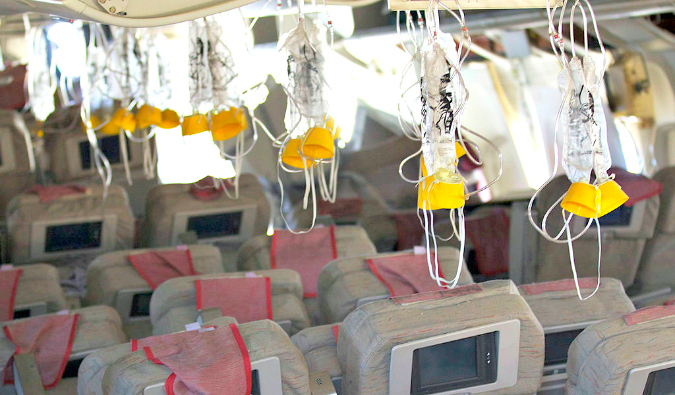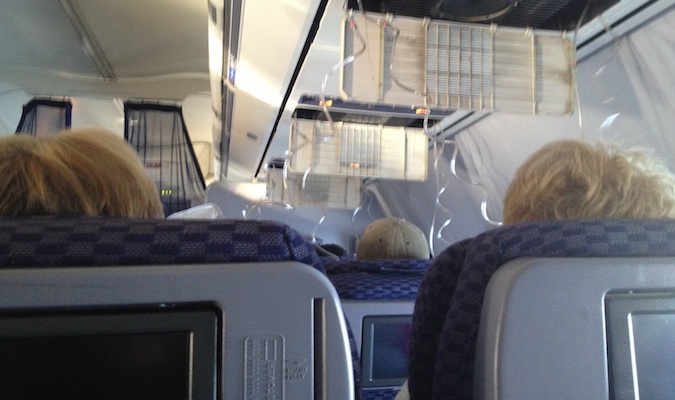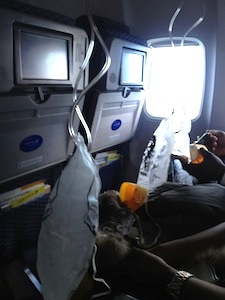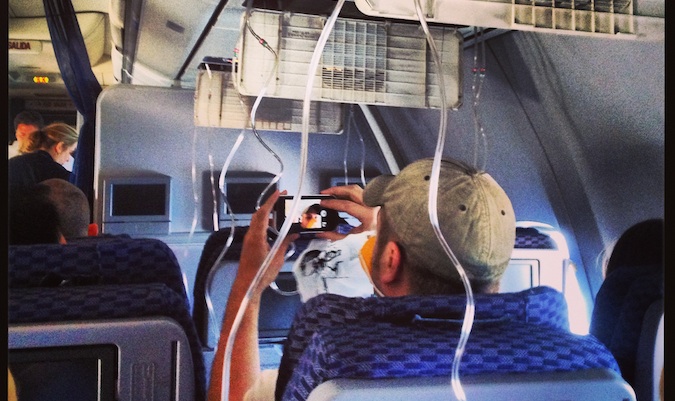 Posted: 01/28/2013 | January 28th, 2013
Posted: 01/28/2013 | January 28th, 2013
Last week, I woke up at 4am to begin a long journey to Eleuthera, Bahamas, for a quick four-day trip. It was going to be a long day on very little sleep. First, Boston to New York, then to Fort Lauderdale before taking my final flight to the Bahamas. I was flying United, my least favorite carrier, but the ticket was free, so I had little choice in the matter.
Shortly after I boarded my plane in New York, the safety briefing began to play. “When the seat belt sign illuminates, you must fasten your seat belt. Insert the metal fittings one into the other and tighten by pulling on the loose end of the strap… In the event of a decompression, an oxygen mask will automatically appear in front of you. To start the flow of oxygen, pull the mask toward you. Place it firmly over your nose and mouth… although the bag does not inflate…” and so on. I’ve heard the safety briefing thousands of times, so I tuned it out and tried to sleep.
Pop. Pop. Pop.
I woke up to the sound of my eardrums popping. “What’s going on?” I thought, shifting in my seat and trying to fall back asleep.
Pop. Pop. Pop.
As my eardrums began to sound like popcorn in a microwave, I couldn’t fall back asleep. They were small, frequent pops, and in my zombie-like state, I couldn’t place why this was happening.
I opened my eyes in a haze when it happened.
All of a sudden, the oxygen masks deployed from above. I looked confusedly at the people next to me. And then in the seats around me. There had been no turbulence. Was this a mistake? Half asleep, I didn’t know what to make of it.
All of a sudden, a voice boomed over the PA system. “Put on your masks.”
Holy crap! This was no mistake.

I reached for my mask. How did that safety briefing go again? “In the event of an emergency, oxygen masks will deploy…” I tried to remember in my sleepy state. After all those safety briefings, you realize you’ve become numb to them, tuned them out. Then when an emergency happens, you think, “What the heck do I do again?”
I put on the mask and fumbled to tighten the strings, taking unnecessarily deep breaths, worried that if I didn’t, I’d suffocate. I looked around. The business traveler next to me kept reading the paper. The woman sitting diagonally from me and the couple to my right all looked petrified. In front of me, I could hear a woman telling her kids, “Mommy loves you, Mommy loves you,” over and over again.
As the situation unfolded, I thought to myself that we had probably just lost cabin pressure, and it was nothing to worry about. We hadn’t taken a dive; we hadn’t hit turbulence.
But minutes passed. And then more and more. There were no announcements about what was going on. Of course I wanted the pilots solving problems, not chatting to me, but the dearth of information made those minutes last forever.

There is nothing scarier than having your plane drop 20,000 feet in seconds. It’s a feeling I never want to experience again in my life.
We soon leveled out, and I later learned that when you lose cabin pressure, you have to drop below 10,000 feet to prevent a loss of consciousness.
Soon, the flight attendants walked casually down the aisle wearing their masks. If you ask any frequent flier, they’ll always tell you that if the flight attendants aren’t scared, you don’t need to be either.
Finally, the captain came on the PA system and explained that, yes, the cabin had lost pressure and, no, there was nothing to worry about, but yes, we would be making an emergency landing.
You always wonder how you’d react in a situation like this. When those masks fall and your plane descends rapidly, will your life flash before your eyes? Will everyone be screaming? Will it be chaos? Will you know what to do?
Surprisingly, none of that happened. My life didn’t flash before my eyes. Everyone stayed calm. We were more in a state of confusion than anything else.

After we landed, my friends and I laughed and talked about it as we sat in Charleston’s airport drinking beer and waiting for a new flight. “Here’s to our first emergency landing!” we cheered.
Yet as I thought about what had happened, I realized just how helpless we are when that plane door closes. Your life is in the hands of two people you will never see or meet. Anything can happen, and you have no control over it. You simply have to trust that they know what they’re doing.
Events like this hit you with the realization that no matter how well you plan your life, all the control you think you have is an illusion. Life happens without you, and you’re really just along for the ride. It’s moments like this that make you relax and live a little. It’s taken a few days for that notion to settle, in but when you realize you have no control, life gets put in perspective.
Go where life takes you, and enjoy the adventure. Have fun. Do what you love. Be with who you love.
Because one day, you’re 35,000 feet above the Atlantic, the masks come down, and the only thing you can do is say to yourself, “If this is it, I regret nothing.”
P.S. These photos were taken after I realized I wasn’t going to die. Additionally, I don’t blame United completely. This could have happened on any airline, but when I overheard the captain say that this was the second time this had happened to him in a week, I got uneasy about the standard of United maintenance.
没有评论:
发表评论